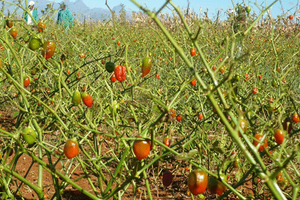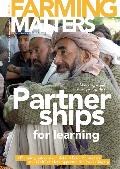Working together brings many benefits, especially in terms of new ideas. These are some of the many examples where collaboration, in different parts of the world, is enhancing learning.
Uganda: Learning around online repositories
Open to all organisations and individuals interested in sharing agricultural knowledge, experiences and information, the Uganda Exchange Group started at the end of 2009. Since then, it has attracted members from all over the country, including extension workers, researchers, NGOs, rural entrepreneurs, public institutions, farmers, and students. It is now hosting the new interactive TECA, (Technologies for Agriculture), an online information, knowledge and communication system for agricultural technologies and proven best practices. This is a pilot FAO initiative that provides an opportunity for researchers and end users to exchange information and learn from each other.
TECA is unique in that it provides information about technologies that have been tested by small-scale farmers, and which can be easily replicated in similar farming systems. At the moment, members of the Uganda Exchange Group are interested in drawing specific lessons in relation to the use of the platform for sharing information, but one is already clear: the need to recognise the importance of sharing information. These lessons will be used to help to set up and facilitate similar exchange and discussion groups in other countries. Thematic discussions and exchange groups on issues such as beekeeping have already been started.
To find out more, contact Estibalitz Morras, Karin Nichterlein, or Bruce Kisitu, at teca@fao.org, or visit the TECA site: www.fao.org/teca
Colombia: Peer-to-peer training
Several months ago, thirteen young women and men from the community of Palenque, in northern Colombia, travelled for ten days around the districts of Santander and Cauca, to visit four micro-enterprises. They were taking part in one of the 40 “Learning Routes” organised by PROCASUR (the Regional Programme for Rural Development Training) in different countries. These Learning Routes are an innovative approach to facilitate exchanges of knowledge and skills between farmers, development projects and private organisations. The thirteen visitors were interested in seeing how their hosts commercialised their products and how they organised themselves to increase profits.
After ten days of talks and field visits, they returned to Palenque with a set of concrete action plans for their own crops and micro-industries. Since then they have been implementing these plans, with some seeing their incomes rise by 35 percent. While those being visited “realised how much we knew”, the Palenque participants were happy to “learn from those like us, with similar problems”. Learning Routes expose participants to case-based experiences and best practices, and use peer exchange to scale up encouraging approaches.
To find out more, contact Ariel Halpern, at PROCASUR, Santiago, Chile. E-mail: ahalpern@procasur.org
South Africa: Cherry peppers in Pothini and Obonjanemi

With help from the Farmer Support Group of the University of KwaZulu-Natal, two groups of farmers from Potshini and Obonjaneni decided to try growing it in their fields. They signed a partnership agreement with the commercial farmer, who agreed to provide the required inputs at cost, technical advice, and to help them transport the produce to the processing unit. At the end of the season, a detailed evaluation showed very positive results, in terms of both crop performance and net incomes: “cherry pepper” proved to be a viable cash crop for this area.
With different stakeholders involved, this experiment included both a technical and a social component. Farmers tried a new crop, and proved that they could produce it successfully. But, through the process, they also developed a new relationship with the commercial farmer. While interactions between them in the past had been limited to discussions (and conflict) regarding the movement of animals from the community to the adjacent farm to seek grazing, working together allowed them to try out new ideas, develop expertise, and increase their incomes.
To find out more, contact Nono Shezi, at the Farmer Support Group, Scottsville, KwaZulu-Natal, South Africa. E-mail: shezin@ukzn.ac.za
Ethiopia: Empowering farmers’ organisations
Established in 2007, the Ethiopian Learning Alliance is a joint initiative between the member organisations of Agri-Profocus and their Ethiopian partners, and it is designed to empower farmers’ organisations in their dealings with value chains. The Alliance involves a learningby- doing approach to value chain development, in which farmer organisations and service providers get together for a series of workshops and assignments. In the process they identify and map the main actors, establish stronger relationships and build engagements, and monitor and evaluate all their activities. Several farmers’ organisations that have been through the process have subsequently developed specific business plans. They have also found different ways of containing losses or increasing incomes by working together as a farmer-marketing organisation (FMO).
In 2009, for example, farmers in Maja Gero had a bad harvest due to an extremely short rainy season, so prices went up. The FMO allowed members to buy grain at a below market price, in exchange for their share of the group’s dividend. The opposite happened in Tulubulu this year. Farmers had bumper harvests of teff, which lowered prices. The FMO would have incurred a loss selling it on the open market. Farmers kept their grain for consumption and agreed to deliver the same amount of grain + 10 percent by the next harvest, thus saving the organisation from a financial blow and benefiting everybody.
To find out more, contact Wim Goris and Eva Smulders, Agri-ProFocus Ethiopia, at wgoris@agriprofocus.nl, or visit http://apf-ethiopia.ning.com

